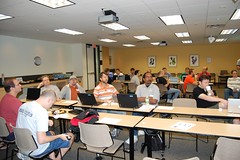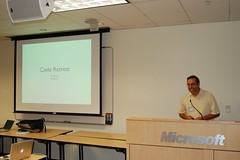Yesterday was the St. Louis Code Retreat and I wanted to capture my experiences and observations. I hadn't heard of Game of Life before reading about Corey Haines' code retreats last year. My field of study in college was life sciences so I missed out on things like Conway's game of life that mathematicians and CS majors are probably exposed to. In prep for the event, I gave Game of Life a try for myself. It was a great experience! I felt totally sucked into the elegance and simplicity of the problem. But enough about that.
On organizing it


We were fortunate to have great sponsors. Microsoft provided the venue, a large space with ample capacity for the 40 people who were signed-up for the event. Oasis Digital funded the breakfast (fantastic pastries, fruit, and coffees) and Object Computing, Inc. (my employer) paid for the sumptuous buffet lunch from Mayuri.
The event was announced back in July and within a week of the free tickets becoming available, all were taken by eager developers from various technical backgrounds. However, of the 40 who signed up to attend, only 26 made it to the event. I had read accounts of previously held code retreats that warned to expect people signing up for the event but canceling at the last minute; given how hard it is to coordinate with a large group of people, this is not surprising. But to have only 65% attendance was, honestly, a disappointment. Given the size of the turn out, though, I was very happy with the range of technical interests among the folks that were there to learn, experiment, and enjoy programming.
Languages, Tools & Format
At the beginning of the day, I said a few words about how the day would be organized. We were to have 3 40-minute pair-programming sessions before lunch, with developers implementing the Game of Life problem in their preferred language or technology, and doing it test-first. Then switching pairs at the end of each session, deleting the last sessions effort and starting over.

The point of the event was practice. Through exploring new languages and experimenting with different approaches to a common problem, all those who made it that day would get a chance to improve on some skill they already had or work with someone who could teach them something they were interested in learning. Attendees took on the game of life problem using a number of different languages and tools.
- Eclipse
- Emacs
- IntelliJ IDEA
- TextMate
- Visual Studio
- C#
- Clojure
- F#
- Java
- JavaScript
- Objective-C
- Ruby
- SQL
A common reaction to the 40 minute time limit was that it was far too short to get a working implementation of Game of Life. The time constraint led to some sessions that scrapped testing altogether in the interests of getting a working implementation as quickly as possible. For others, it meant only being able to implement a partial, test-backed solution. Personally, I appreciated peering into the lightning-like minds of some of St. Louis' most talented software professionals. I liked what I saw in the clojure implementations that I watched and paired on and found myself inspired to take clojure on as my next language of study.
Organizing this event was a learning experience for me. Several people asked whether there would be another one next year. I really hope so ;-) It wasn't a crazy level of effort to organize (nothing on the scale of a major conference). I am curious whether I'd set the date for the event too far in the future and whether that was why there were so many people that cancelled their tickets. Next year, if the stars align like they did this year for venue and food sponsors, St. Louis will see another Code Retreat.
Interesting implementations
I have found a number of Game of Life implementations on the web that I think are pretty cool. Here are just a few.





